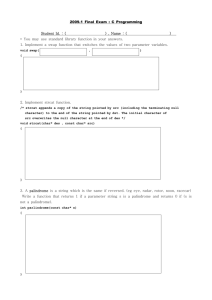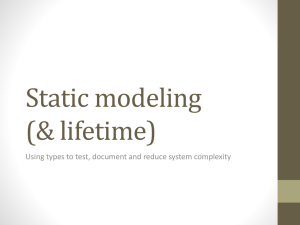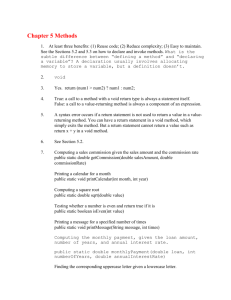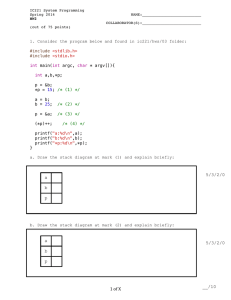Document 13380258
advertisement
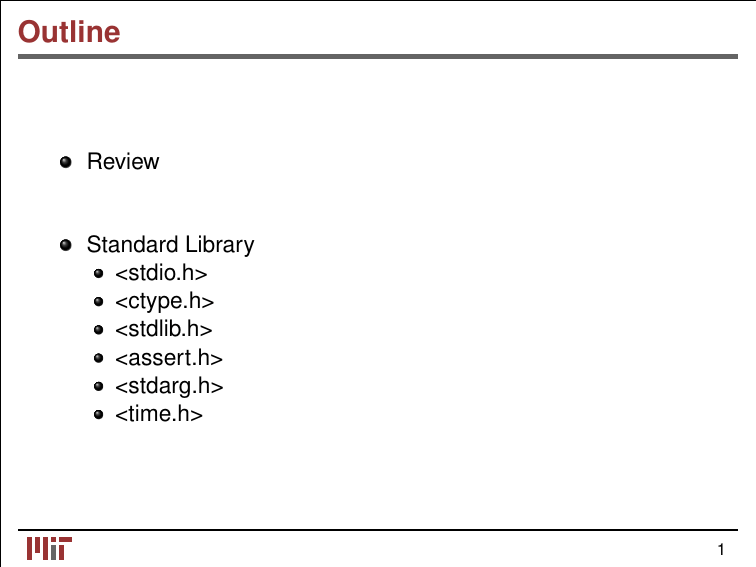
Outline
Review
Standard Library
<stdio.h>
<ctype.h>
<stdlib.h>
<assert.h>
<stdarg.h>
<time.h>
1
6.087 Lecture 10 – January 25, 2010
Review
Standard Library
<stdio.h>
<ctype.h>
<stdlib.h>
<assert.h>
<stdarg.h>
<time.h>
2
Review: Libraries
• linking: binds symbols to addresses.
• static linkage: occurs at compile time (static libraries).
• dynamic linkage: occurs at run time (shared libraries).
• shared libraries:
• ld.so - locates shared libraries
• ldconfig - updates links seen by ld.so
• dlopen(),dlsym(),dlclose() - load shared libraries
on demand.
• compiling static libraries: gcc,ar
• compiling shared libraries: gcc,ldconfig
2
Review: BTree
• generalized search tree–multiple children.
• except for root, each node can have between t and 2t
children.
• tree is always balanced.
• Used in file systems, databases etc.
3
Review: Priority Queue
• abstract data structure: many implementations
• common implementations: heaps,bst,linked list
• elements are queued and dequeued in order of priority.
• operations:
peek(),insert(),extract-max()/extract-min()
4
6.087 Lecture 10 – January 25, 2010
Review
Standard Library
<stdio.h>
<ctype.h>
<stdlib.h>
<assert.h>
<stdarg.h>
<time.h>
5
<stdio.h>: Opening, closing files
FILE∗ fopen(const char∗ filename,const char∗ mode)
• mode can be "r"(read),"w"(write),"a"(append).
• "b" can be appended for binary input/output (unnecessary
in *nx)
• returns NULL on error.
FILE∗ freopen(const char∗ filename,const char∗ mode,FILE∗ stream)
• redirects the stream to the file.
• returns NULL on error.
• Where can this be used? (redirecting stdin,stdout,stderr)
int fflush (FILE∗ stream)
• flushes any unwritten data.
• if stream is NULL flushes all outputs streams.
• returns EOF on error.
5
<stdio.h>: File operations
int remove(const char∗ filename)
• removes the file from the file system.
• retrn non-zero on error.
int rename(const char∗ oldname,const char∗ newname)
• renames file
• returns non-zero on error (reasons?: permission,
existence)
6
<stdio.h>:Temporary files
FILE∗ tmpfile(void)
• creates a temporary file with mode "wb+".
• the file is removed automatically when program
terminates.
char∗ tmpnam(char s[L_tmpnam])
• creates a string that is not the name of an existing file.
• return reference to internal static array if s is NULL.
Populate s otherwise.
• generates a new name every call.
7
<stdio.h>: Raw I/O
size_t fread(void∗ ptr , size_t size , size_t nobj,FILE∗ stream)
• reads at most nobj items of size size from stream into
ptr.
• returns the number of items read.
• feof and ferror must be used to test end of file.
size_t fwrite (const void∗ ptr,size_t size , size_t nobj,FILE∗ stream)
• write at most nobj items of size size from ptr onto
stream.
• returns number of objects written.
8
<stdio.h>: File position
int fseek(FILE∗ stream, long offset,int origin )
• sets file position in the stream. Subsequent read/write
begins at this location
• origin can be SEEK_SET, SEEK_CUR, SEEK_END.
• returns non-zero on error.
long ftell (FILE∗ stream)
• returns the current position within the file. (limitation? long
data type).
• returns -1L on error.
int rewind(FILE∗ stream)
• sets the file pointer at the beginning.
• equivalent to fseek(stream,0L,SEEK_SET);
9
<stdio.h>: File errors
void clearerr (FILE∗ stream)
• clears EOF and other error indicators on stream.
int feof (FILE∗ stream)
• return non-zero (TRUE) if end of file indicator is set for
stream.
• only way to test end of file for functions such as
fwrite(),fread()
int ferror (FILE∗ stream)
• returns non-zero (TRUE) if any error indicator is set for
stream.
10
<ctype.h>: Testing characters
isalnum(c)
iscntrl (c)
isdigit (c)
islower(c)
isprint (c)
ispunct(c)
isspace(c)
isupper(c)
isalpha(c) || isdigit (c)
control characters
0-9
’a’-’z’
printable character (includes space)
punctuation
space, tab or new line
’A’-’Z’
11
<string.h>: Memory functions
void∗ memcpy(void∗ dst,const void∗ src,size_t n)
• copies n bytes from src to location dst
• returns a pointer to dst.
• src and dst cannot overlap.
void∗ memmove(void∗ dst,const void∗ src,size_t n)
• behaves same as memcpy() function.
• src and dst can overlap.
int memcmp(const void∗ cs,const void∗ ct,int n)
• compares first n bytes between cs and ct.
void∗ memset(void∗ dst,int c,int n)
• fills the first n bytes of dst with the value c.
• returns a pointer to dst
12
<stdlib.h>:Utility
double atof(const char∗ s)
int atoi (const char∗ s)
long atol(const char∗ s)
• converts character to float,integer and long respectively.
int rand()
• returns a pseduo-random numbers between 0 and
RAND_MAX
void srand(unsigned int seed)
• sets the seed for the pseudo-random generator!
13
<stdlib.h>: Exiting
void abort(void)
• causes the program to terminate abnormally.
void exit ( int status)
• causes normal program termination. The value status is
returned to the operating system.
• 0 EXIT_SUCCESS indicates successful termination. Any
other value indicates failure (EXIT_FAILURE)
14
<stdlib.h>:Exiting
void atexit (void (∗fcn )( void))
• registers a function fcn to be called when the program
terminates normally;
• returns non zero when registration cannot be made.
• After exit() is called, the functions are called in reverse
order of registration.
int system(const char∗ cmd)
• executes the command in string cmd.
• if cmd is not null, the program executes the command and
returns exit status returned by the command.
15
<stdlib.h>:Searchign and sorting
void ∗ bsearch ( const void ∗ key , const void ∗ base ,
s i z e _ t n , s i z e _ t size ,
i n t ( ∗ cmp ) ( const void ∗ keyval , const void ∗ datum ) ) ;
• searches base[0] through base[n-1] for *key.
• function cmp() is used to perform comparison.
• returns a pointer to the matching item if it exists and NULL
otherwise.
void q s o r t ( void ∗ base , s i z e _ t n ,
s i z e _ t sz ,
i n t ( ∗ cmp ) ( const void ∗ , const void ∗ ) ) !
• sorts base[0] through base[n-1] in
ascending/descending order.
• function cmp() is used to perform comparison.
16
<assert.h>:Diagnostics
void assert(int expression)
• used to check for invariants/code consistency during
debugging.
• does nothing when expression is true.
• prints an error message indicating, expression, filename
and line number.
Alternative ways to print filename and line number during
execution is to use: __FILE__,__LINE__ macros.
17
<stdarg.h>:Variable argument lists
Variable argument lists:
• functions can variable number of arguments.
• the data type of the argument can be different for each
argument.
• atleast one mandatory argument is required.
• Declaration:
int printf (char∗ fmt ,...); /∗fmt is last named argument∗/
va_list ap
• ap defines an iterator that will point to the variable
argument.
• before using, it has to be initialized using va_start.
18
<stdarg.h>:Variable argument list
va_start( va_list ap, lastarg )
• ap lastarg refers to the name of the last named argument.
• va_start is a macro.
va_arg(va_list ap, type)
• each call of va_arg points ap to the next argument.
• type has to be inferred from the fixed argument (e.g. printf)
or determined based on previous argument(s).
va_end(va_list ap)
• must be called before the function is exited.
19
<stdarg.h>:Variable argument list(cont.)
i n t sum ( i n t num , . . . )
{
v a _ l i s t ap ; i n t t o t a l =0;
v a _ s t a r t ( ap , num ) ;
while ( num>0)
{
t o t a l +=va_arg ( ap , i n t ) ;
num−−;
}
va_end ( ap ) ;
r e t u r n t o t a l ;
}
i n t suma=sum ( 4 , 1 , 2 , 3 , 4 ) ; / ∗ c a l l e d w i t h f i v e args ∗ /
i n t sumb=sum ( 2 , 1 , 2 ) ; / ∗ c a l l e d w i t h t h r e e args ∗ /
20
<time.h>
time_t, clock_t , struct tm data
int tm_sec
int tm_min
int tm_hour
int tm_mday
struct tm:
int tm_mon
int tm_year
int tm_wday
int tm_yday
int tm_isdst
types associated with time.
seconds
minutes
hour since midnight (0,23)
day of the month (1,31)
month
years since 1900
day since sunday (0,6)
day since Jan 1 (0,365)
DST flag
21
<time.h>
clock_t clock ()
• returns processor time used since beginning of program.
• divide by CLOCKS_PER_SEC to get time in seconds.
time_t time(time_t ∗ tp)
• returns current time (seconds since Jan 1 1970).
• if tp is not NULL, also populates tp.
double difftime(time_t t1 ,time_t t2)
• returns difference in seconds.
time_t mktime(struct tm∗ tp)
• converts the structure to a time_t object.
• returns -1 if conversion is not possible.
22
<time.h>
char∗ asctime(const struct tm∗ tp)
• returns string representation of the form "Sun Jan 3
15:14:13 1988".
• returns static reference (can be overwritten by other calls).
struct tm∗ localtime(const time_t ∗ tp)
• converts calendar time to local time".
char∗ ctime(const time_t ∗ tp)
• converts calendar time to string representation of local
time".
• equivalent to sctime(locltime(tp))!
23
<time.h>
size_t strftime (char∗ s,size_t smax,const char∗ fmt,const struct tm∗ tp)
• returns time in the desired format.
• does not write more than smax characters into the string s.
%a
%A
%b
%B
%d
%H
%I
%m
%M
%p
%S
abbreviated weekday name
full weekday name
abbreviated month name
full month name
day of the month
hour (0-23)
hour (0-12)
month
minute
AM/PM
second
24
MIT OpenCourseWare
http://ocw.mit.edu
6.087 Practical Programming in C
January (IAP) 2010
For information about citing these materials or our Terms of Use,visit: http://ocw.mit.edu/terms.

